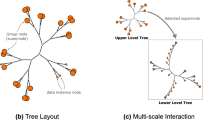Abstract
In this paper, we discuss the problem of organizing the different ways of computing the interestingness of a particular cell derived from a cube in the context of a hierarchical, multidimensional space. We start from an in-depth study of the interestingness aspects in the study of human behavior and include in our survey the approaches taken by computer-science efforts in the area of data mining and user recommendations. We move on to structure interestingness along different fundamental, high level aspects, and, due to their high-level nature, we also move towards much more concrete data-oriented definitions of interestingness aspects.
Access this chapter
Tax calculation will be finalised at checkout
Purchases are for personal use only
Similar content being viewed by others
Notes
- 1.
- 2.
We do not distinguish between the terms session and exploration in what follows.
- 3.
- 4.
In this implementation, the user belief is agnostic of measure values, and the metric therefore characterizes how surprising it is that the user visits this particular cell.
References
Aggarwal, C.C.: Data Mining - The Textbook. Springer, Cham (2015). https://doi.org/10.1007/978-3-319-14142-8
Aligon, J., Gallinucci, E., Golfarelli, M., Marcel, P., Rizzi, S.: A collaborative filtering approach for recommending OLAP sessions. Decis. Support Syst. 69, 20–30 (2015)
Bie, T.D.: Subjective interestingness in exploratory data mining. In: Tucker, A., Höppner, F., Siebes, A., Swift, S. (eds.) IDA 2013. LNCS, vol. 8207, pp. 19–31. Springer, Heidelberg (2013). https://doi.org/10.1007/978-3-642-41398-8_3
Djedaini, M., Drushku, K., Labroche, N., Marcel, P., Peralta, V., Verdeau, W.: Automatic assessment of interactive OLAP explorations. Inf. Syst. 82, 148–163 (2019)
Djedaini, M., Labroche, N., Marcel, P., Peralta, V.: Detecting user focus in OLAP analyses. In: Kirikova, M., Nørvåg, K., Papadopoulos, G.A. (eds.) ADBIS 2017. LNCS, vol. 10509, pp. 105–119. Springer, Cham (2017). https://doi.org/10.1007/978-3-319-66917-5_8
Eirinaki, M., Abraham, S., Polyzotis, N., Shaikh, N.: QueRIE: collaborative database exploration. IEEE Trans. Knowl. Data Eng. 26(7), 1778–1790 (2014)
Fabris, C.C., Freitas, A.A.: Incorporating deviation-detection functionality into the OLAP paradigm. In: SBBD, pp. 274–285 (2001)
Förster, J., Marguc, J., Gillebaart, M.: Novelty categorization theory. Soc. Pers. Psychol. Compass 4(9), 736–755 (2010)
Geng, L., Hamilton, H.J.: Interestingness measures for data mining: a survey. ACM Comput. Surv. 38(3), 9 (2006)
Gkesoulis, D., Vassiliadis, P., Manousis, P.: CineCubes: aiding data workers gain insights from OLAP queries. Inf. Syst. 53, 60–86 (2015)
Gunawardana, A., Shani, G.: A survey of accuracy evaluation metrics of recommendation tasks. J. Mach. Learn. Res. 10, 2935–2962 (2009)
Han, J., Kamber, M., Pei, J.: Data Mining: Concepts and Techniques, 3rd edn. Morgan Kaufmann, Burlington (2011)
Harinarayan, V., Rajaraman, A., Ullman, J.D.: Implementing data cubes efficiently. In: SIGMOD, pp. 205–216 (1996)
Herlocker, J.L., Konstan, J.A., Terveen, L.G., Riedl, J.: Evaluating collaborative filtering recommender systems. ACM Trans. Inf. Syst. 22(1), 5–53 (2004)
Jensen, C.S., Pedersen, T.B., Thomsen, C.: Multidimensional Databases and Data Warehousing. Synthesis Lectures on Data Management. Morgan & Claypool Publishers, San Rafael (2010)
Kaminskas, M., Bridge, D.: Diversity, serendipity, novelty, and coverage: a survey and empirical analysis of beyond-accuracy objectives in recommender systems. TiiS 7(1), 2:1–2:42 (2017)
Klemettinen, M., Mannila, H., Toivonen, H.: Interactive exploration of interesting findings in the telecommunication network alarm sequence analyzer (TASA). Inf. Softw. Technol. 41(9), 557–567 (1999)
Kumar, N., Gangopadhyay, A., Bapna, S., Karabatis, G., Chen, Z.: Measuring interestingness of discovered skewed patterns in data cubes. Decis. Support Syst. 46(1), 429–439 (2008)
Litman, J.: Curiosity and the pleasures of learning: wanting and liking new information. Cogn. Emot. 19(6), 793–814 (2005)
Reisenzein, R., Meyer, W.U., Niepel, M.: Surprise. In: Ramachandran, V.S. (ed.) Encyclopedia of Human Behavior, 2nd edn. Elsevier, London (2012)
Salimi, B., Gehrke, J., Suciu, D.: Bias in OLAP queries: detection, explanation, and removal. In: SIGMOD, pp. 1021–1035 (2018)
Sarawagi, S.: Explaining differences in multidimensional aggregates. In: Proceedings of VLDB, pp. 42–53 (1999)
Sarawagi, S.: User-adaptive exploration of multidimensional data. In: Proceedings of VLDB, pp. 307–316 (2000)
Sarawagi, S., Agrawal, R., Megiddo, N.: Discovery-driven exploration of OLAP data cubes. In: EDBT, pp. 168–182 (1998)
Sathe, G., Sarawagi, S.: Intelligent rollups in multidimensional OLAP data. In: Proceedings of VLDB, pp. 531–540 (2001)
Yao, Y., Chen, Y., Yang, X.D.: A measurement-theoretic foundation of rule interestingness evaluation. In: Young Lin, T., Ohsuga, S., Liau, C.J., Hu, X. (eds.) Foundations and Novel Approaches in Data Mining. SCI, vol. 9. Springer, Heidelberg (2005). https://doi.org/10.1007/11539827_3
Zhao, Z., Stefani, L.D., Zgraggen, E., Binnig, C., Upfal, E., Kraska, T.: Controlling false discoveries during interactive data exploration. In: SIGMOD, pp. 527–540 (2017)
Author information
Authors and Affiliations
Corresponding author
Editor information
Editors and Affiliations
Rights and permissions
Copyright information
© 2019 Springer Nature Switzerland AG
About this paper
Cite this paper
Marcel, P., Peralta, V., Vassiliadis, P. (2019). A Framework for Learning Cell Interestingness from Cube Explorations. In: Welzer, T., Eder, J., Podgorelec, V., Kamišalić Latifić, A. (eds) Advances in Databases and Information Systems. ADBIS 2019. Lecture Notes in Computer Science(), vol 11695. Springer, Cham. https://doi.org/10.1007/978-3-030-28730-6_26
Download citation
DOI: https://doi.org/10.1007/978-3-030-28730-6_26
Published:
Publisher Name: Springer, Cham
Print ISBN: 978-3-030-28729-0
Online ISBN: 978-3-030-28730-6
eBook Packages: Computer ScienceComputer Science (R0)




